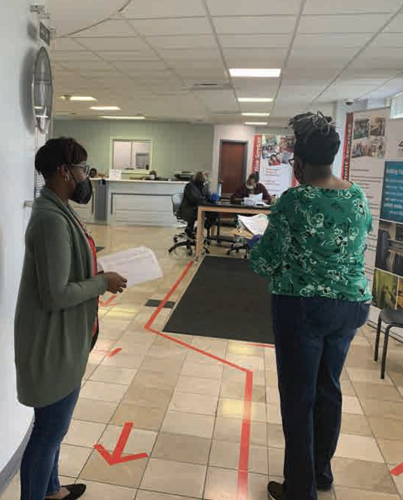While the COVID-19 virus has had injurious effects on the health of millions of people across the United States, the disease has disproportionately affected African Americans. This alarming trend has proven true in central Ohio as well, with Black individuals overrepresented in both cases and hospitalizations.
The disparity puts an additional strain on a population already challenged by health and economic discrepancies, explained Stephanie Hightower, President and CEO of Columbus Urban League (CUL). CUL has been on the front lines of helping the Black community address the overall impact of the pandemic, including those who have lost employment and the clients they serve who are re-entering the community after incarceration.
“We know that we [the Black community] have been economically marginalized and are in the lower realm of the economic ladder when it comes to pay equity,” said Hightower. “We know that housing is already not stable for Black people in our community. We know that with the schools closing, the summer learning loss that most kids in the urban school districts experience was going to be exacerbated tenfold.”

Columbus Urban League staff reconfigured its office space to ensure social distancing. Photo courtesy of CUL.
The grant from the Emergency Response Fund helped CUL with a number of efforts, from refurbishing computers and implementing new communications efforts, to providing additional staffing hours as the need to provide in-person services and create virtual programs increased.
“The jumpstart funds from The Columbus Foundation really gave us the ability to communicate the services that were out there, and gave us the ability to keep the Black community connected so they got the necessary and crucial information to stay healthy, safe, and keep their families safe during the pandemic,” Hightower said.
Housing stabilization was, and is, one of the biggest challenges. Your dollars helped provide support for salaries to keep team members in play here at Columbus Urban League so they could help folks navigate that process.
Stephanie Hightower, President and CEO of Columbus Urban League
CUL created two efforts to educate and communicate information related to the pandemic, including the formation of an African American civic leaders’ group, which brought together Black leaders from human services organizations and faith-based institutions, as well as elected officials and activists, to exchange ideas. The group conducted weekly virtual town hall meetings, inviting experts on COVID-19 to discuss how it was affecting the Black population.
With support from the Foundation, CUL was also able to develop a live, weekly radio program broadcast on all three local Radio One stations that helped share valuable information and resources with the Black community.
“Because we had so many people working remotely, we had to expand our IT infrastructure,” Hightower explained. “We also bought PPE for staff who had to go out and were part of food drives, or if clients were coming in.”
Hightower is excited about the opportunity to serve even more people in the future, saying the pandemic has given the organization a chance to reposition and elevate CUL’s profile in the community.
“I’m a firm believer that you don’t let a good crisis go to waste, and that’s what we’ve done here,” she said. “We’ve made sure that we were where we were supposed to be—able to help the community that we were created to serve in the first place.”
The Columbus Foundation’s Emergency Response Fund was activated on Monday, March 9, to help Franklin County nonprofit organizations as they assist those in our community affected by the Coronavirus pandemic. Within a week of launching the fund, grants were already being deployed to help nonprofits support the most vulnerable in our community.